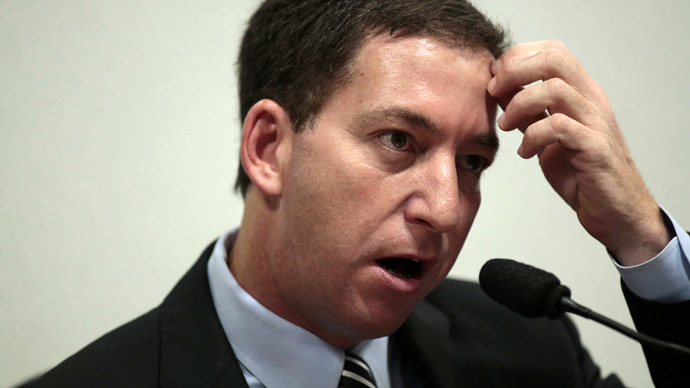Snowden confidant Glenn Greenwald a ‘porn spy,’ says Canadian politician

Following a report that passengers using Wi-Fi service at a Canadian airport were trailed for days via their wireless devices, one prominent Canadian politician has rejected the charges, while disparaging former Guardian reporter Glenn Greenwald.
As hardly a week goes by without some new shocking revelation
being divulged from US whistleblower Edward Snowden’s trove of
classified documents from the National Security Agency (NSA),
battle lines are being drawn between those who hail the former
CIA contractor as a national hero, and those who condemn him as a
traitor.
Such bitter reckoning invariably includes some degree of
passionate debate, the sort of which was on full display in the
Canadian Parliament on Friday when Prime Minister Stephen
Harper's parliamentary secretary, Paul Calandra, blasted the
allegations published by the Canadian Broadcasting Corporation
(CBC).
“Mr. Speaker, last night the CBC aired a misleading report on
Canada's signals intelligence agency, Communications Security
Establishment Canada (CSEC),” Calandra told MPs. “These
documents were stolen by former NSA contractor, Edward Snowden
and sold to the CBC by Glenn Greenwald.”
Calandra said the country’s electronic spy agency voiced its
objections that the CBC story was not correct, yet “the CBC
went ahead and published it anyway.”
The exclusive story by CBC, which was co-authored by Glenn
Greenwald, said that travelers passing through a major Canadian
airport were unwittingly caught up in an electronic surveillance net, which allowed
the CSEC to track the wireless devices of thousands of airline
passengers – even for days after they had left the terminal.
“In the case of the airport tracking operation, the metadata
apparently identified travelers' wireless devices, but not the
content of calls made or emails sent from them,” the article
said.
Professor Ronald Deibert, an internet security expert at the
University of Toronto, is convinced the agency’s activities are
illegal. He said: "I can't see any circumstance in which this
would not be unlawful, under current Canadian law, under our
Charter, under CSEC's mandates."
Calandra, Harper’s parliamentary secretary, said that before the
story aired, CSEC denied that anything in Snowden’s disclosures
showed that passengers using Wi-Fi in a major Canadian airport
had their communications “targeted, collected, or used, nor
that travellers' movements were tracked.”
CSEC's intelligence work is regularly reviewed by an independent
agency that has “consistently found it has followed the
law,” he added.
Calandra then dropped a proverbial bombshell on the former
Guardian journalist who first broke the Snowden story last
summer: “Why is furthering porn-spy Glenn Greenwald's agenda
and lining his Brazilian bank account more important than
maintaining the public broadcaster's journalistic
integrity?”
The secretary's comment on the “Brazilian bank account”
appeared to be a reference to Pierre Omidyar, the founder of
eBay, who put up $50 million into a new media venture he is
setting up with Greenwald. However, what Calandra was referring
to in his comment about Greenwald being a “porn spy” is
less clear.
The only connection to porn in this ongoing saga seems to be
connected to the NSA’s alleged gathering of online visits to
pornography websites, aimed specifically at
Muslims, whom the agency was seeking to discredit due to their
“radicalizing” efforts.
The NSA document, dated Oct. 3, 2012, aims to exploit the
“personal vulnerabilities” of its targets through their
online tendencies, including “viewing sexually explicit
material online” and “using sexually explicit persuasive language
when communicating with inexperienced young girls.”
Meanwhile, Edward Snowden, presently living in Russia where he
was granted temporary asylum last August, has also been the
target of fierce criticism by political leaders whose
governments’ intelligence activities were exposed in the massive
security breach.
Australian Prime Minister Tony Abbott this week declared Snowden
a “traitor” who “betrayed his country,” just
one week after his foreign minister, Julie Bishop, during a
speech in Washington, accused the former NSA contractor of
“unprecedented treachery” and “shamefully betraying
his nation” .














